About the 2015 Food Recovery Challenge Award Winners
Many of the 2015 Food Recovery Challenge award winners shared details and quotes about their wasted food prevention and diversion activities and about their awards with EPA. Read about their accomplishments and how they achieved them.
On this page:
- Salem State University
- Sprouts Farmers Market: 24
- Pearl City High School
- Ortega National Parks, LLC - White Sands Trading Company
- Serendipity Catering
- SAVOR...Chicago-McCormick Place South
- Orange County Sheriff’s Department, Theo Lacy Facility
- University of California, Santa Cruz
- Clark University
- MB Financial Park at Rosemont/Village of Rosemont
- Crystal Creamery
- City of Philadelphia - Philadelphia Prison System
- Keene State College
- Massachusetts Department of Environmental Protection
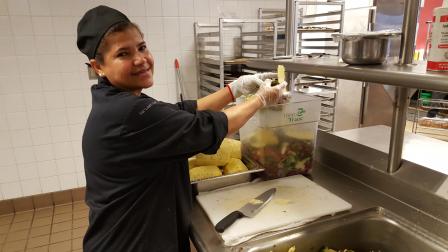 Salem State University
Salem State University
Data-driven Winner, Colleges and Universities
“Chartwells is honored to work with Salem State University in support of sustainability initiatives and proud to receive the EPA’s Food Recovery national award. By implementing programs that provide solutions, Chartwells’ will continue to build upon sustainable food management practices that support the environment and local communities.” -- John Hayes FMP, Resident District Manager at Salem State University
Sprouts Farmers Market: 24
Data-driven Winner, Grocers
Sprouts Farmers Market: 24, located in Tucson, Arizona achieved an 11,800 percent increase in wasted food diversion comparing its 2014 data to its 2013 data.
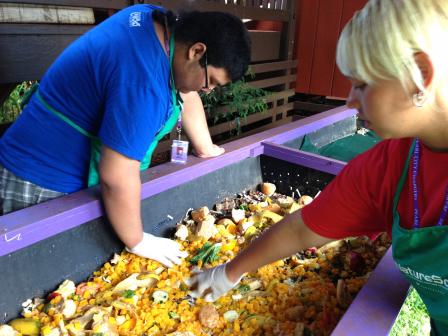 Pearl City High School
Pearl City High School
Data-driven Winner, K-12 Schools
During the 2014 – 2015 school year, Special Education students at Pearl City High School in partnership with Mindy Jaffe, owner of Waikiki Worm Co., staffed wasted food collection stations in the school cafeteria. Unconsumed food was separated from non-food waste, diverting the potentially-wasted food from the general school trash stream. The fruits, vegetables, and selected starches were fed to composting worms and the remaining wasted food was hot composted, creating nutrient rich, organic products used in gardens in the community. This initiative resulted in 34,635 pounds of cafeteria scraps being composted on site over the school year, and a 97.5 percent wasted food diversion rate overall.
Ortega National Parks, LLC - White Sands Trading Company
Data-driven Winner, Hospitality
Ortega National Parks is dedicated to meeting and exceeding protection of the unique environments and precious resources where they operate, allowing their guests and future generations to experience the beauty, serenity, and splendor of the local and national parks. They annually establish and review objectives and targets based on their commitment to pollution prevention and continuous environmental improvement.
As a family-run company, Ortega National Parks operates in small to medium size Park operations where they can make a real difference in reducing the local ecosystem impact of not only their operations, but also of Park visitors. Their success is in large part due to the fact that they do not consider the local and National Parks just another business. They consider it a privilege to work as junior partners with the National Park Service and local communities to keep the Parks “America’s Best Idea”.
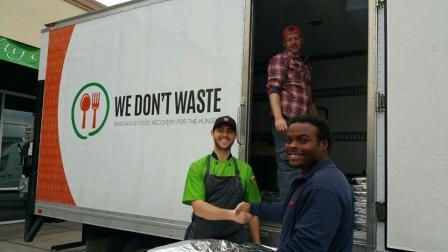 Serendipity Catering
Serendipity Catering
Data-driven Winner, Restaurants and Food Service Providers
Serendipity Catering means business – a business leading by example that is. And that means keeping good food out of landfills. Serendipity Catering, a current participant of the Food Recovery Challenge, was chosen as the national data-driven award winner in the restaurant/food service sector by showing an almost 59 percent increase in total wasted food diversion compared to the previous year. Where possible, Serendipity donates untouched food to non-profit organizations, composts event wasted food, and offers haul-out services to clients. Through these efforts, this Denver-based business diverts 95 percent of all kitchen wasted food from conventional landfills and helps both people, and the environment.
SAVOR…Chicago-McCormick Place South
Data-driven Winner, Sports and Entertainment Venues
As the exclusive food and beverage provider at McCormick Place, SAVOR…Chicago’s commitment extends beyond providing locally sourced fresh menu choices to providing exceptional customer service for exhibit managers, show producers and their many attendees. They also take their commitment to the environment very seriously and, along with the Metropolitan Pier and Exposition Authority, are focused on driving significant change in the convention center industry.
SAVOR…Chicago uses McCormick Place’s south building as the main production kitchen and warehouse operation, which allows them to train and monitor more effectively. Their post-consumer Green Angel visitor education and recycling program sorts compost and recycling materials to increase their waste diversion rate.
SAVOR…Chicago also achieved an APEX international certification in sustainable food and beverage. They have great partners in the community and SAVOR…Chicago donated over 41,000 pounds of food to local charities including the Pacific Garden Mission. More than 37 tons of food has been donated to local charities since it began its work at McCormick Place.
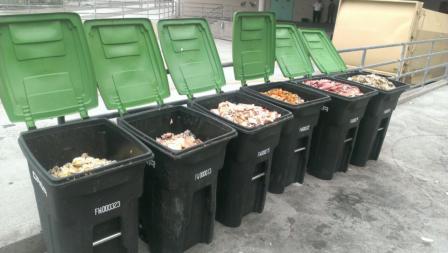 Orange County Sheriff’s Department (OCSD) - Theo Lacy Facility
Orange County Sheriff’s Department (OCSD) - Theo Lacy Facility
Data-driven Winner, Other Organization
The Sustainability Team at Theo Lacy collaborated with officials from Orange County Environmental Health and the Health Care Agency to establish a food donation program that has the blessing of the Orange County Board of Supervisors. The Sustainability Deputies work closely with OCSD’s Food Services Division to conduct a “food audit” so as to determine the amount of unconsumed wasted food Theo Lacy produces, and which types of foods could possibly be donated to the Orange County Food Bank and other programs that combat hunger in Orange County such as Dr. Eric Handler’s “Waste Not, Want Not” initiative. During the last part of 2014, Theo Lacy donated roughly 4 tons of food to the Orange County Food Bank. The donated food reduced the amount of waste sent to the landfill and helped feed 100 meals a day to people that need it most. The amount of food that is donated fluctuates based on the availability from our Food Services Division.
Theo Lacy also recognized that post-consumer wasted food was roughly 30 percent of the weight total that was being sent to the landfill. In response to this, the team worked directly with their waste carrier who provided the facility with six food waste recycle bins. It is now procedure for all wasted food that comes out of the kitchen to be recycled into these bins and taken to be composted.
Theo Lacy uses a few different methods to recycle the post-consumer wasted food. Wasted food is sorted daily in the Theo Lacy kitchen before and after each meal to be recycled. The inmates that use the facilities chow hall recycle by dumping the wasted food from their trays into designated wasted food bins. They also use inmate workers to sort the facility's trash daily and capture wasted food before it reaches the landfill. Using this process, they were able to prevent 129 tons of wasted food from entering the landfill in 2014.
The Sustainability Team also worked closely with the Food Services Division to develop a more efficient way to distribute sack lunches to the inmate population. They developed a method to account for inmates that were at court, getting release, or being transferred to other facilities. This process kept food from leaving the kitchen which reduced waste overall.
University of California, Santa Cruz
Narrative Category Winner, Source Reduction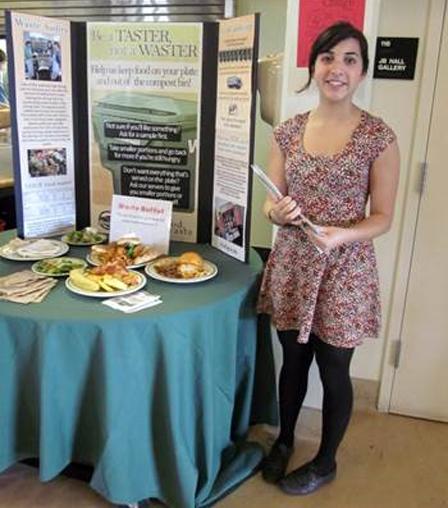
"We have been told by students that what they have learned while dining with us carries over when they go home, and they have become "waste warriors" for their families and communities." -- Clint Jeffries, Sustainability Manager, University of California, Santa Cruz Dining
University of California, Santa Cruz achieved impressive source reduction of wasted food through a variety of approaches involving both staff and students. They monitor and track wasted food in the kitchen, from buffets and serving lines and plate waste. They use this information to adjust the amount and type of food they order and prepare. Dining Services also trains kitchen staff to properly store and rotate ingredients, and to use the best preparation techniques to reduce wasted food. Additionally, they pre-plate appropriate serving sizes, educate students on daily offerings and give samples so diners take only what they will eat, and educate student and staff about wasted food and waste reduction.
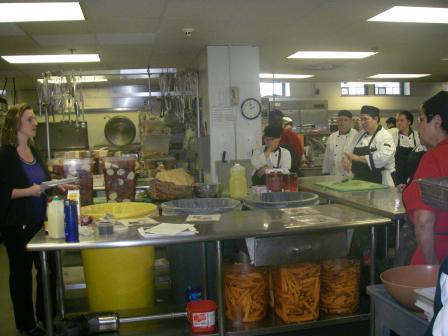 Clark University
Clark University
Narrative Category Honorable Mention, Source Reduction
Clark University’s Dining Services, managed by Sodexo, implements “from scratch” meal preparation starting with un-processed foods that are prepared fresh every day and creatively reuse trimmings for stocks, soups and sauces, to greatly reduce waste. Employees are encouraged to develop and share ideas to reduce waste further, including monitoring for recyclable and compostable waste in color-coded buckets. Their LeanPath Food Waste Prevention Tracking System recorded source reduction of 12,019 pounds in a year period.
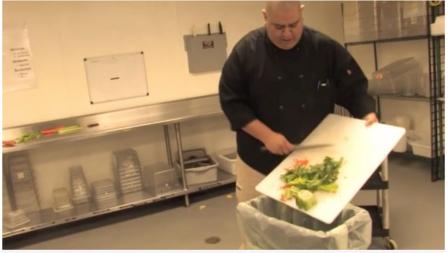 MB Financial Park at Rosemont/Village of Rosemont
MB Financial Park at Rosemont/Village of Rosemont
Narrative Category Winner, Leadership
“Building a public-private partnership between Rosemont and the businesses operating at MB Financial Park has resulted in a wasted food reduction and collection program stronger than the sum of its parts. The consistent volume and route density provided by the Park supports growth of the local compost collection service and infrastructure.” -- Stephanie Katsaros, President of Bright Beat, Sustainability Partner to MB Financial Park at Rosemont
The MB Financial Park at Rosemont entertainment district underwent key infrastructure upgrades to help divert wasted food from landfills. The “Green For A Reason” program helped 1,000 employees and 1.6 million visitors keep food recovery and waste diversion top of mind resulting in the recovery of more than 150 tons of organics.
Crystal Creamery
Narrative Category Winner, Innovation
“It is always great to be recognized for our work, and this is especially true when it comes to the work we have accomplished in the area of sustainability, specifically, with the dairy digester partnership. Crystal Creamery firmly believes that we have a responsibility in making sure that we do our best in giving back to our community and reducing wasted food does just that. Thank you and please know that we will continue to seek out other activities that further enhance the sustainability of our company.” -- Frank Otis, President at Crystal Creamery
Crystal Creamery operates an industrial waste water pretreatment system to remove organic contaminants from waste water generated during the dairy product manufacturing processes. The organic by-products are removed and then transported to a local dairy farm with an anaerobic co-digestion facility where it is combined with manure and other wasted food to produce electricity and a liquid and solid by-product, which are valuable commodities. This has produced enough electricity to power 38 homes, saved both businesses money, and reduced greenhouse gas emissions.
City of Philadelphia - Philadelphia Prison System
Narrative Category Honorable Mention, Innovation
“A comprehensive green technologies program will help to prepare the returning citizen with gainful employment; while aiding in a successful integration back to the community.” -- Laura R. Cassidy, Executive Assistant to the Commissioner, Green Program Coordinator/Project Manager
The Philadelphia Prison system consists of six facilities with an average daily inmate population of 8,250 and approximately 2,600 employees. The Riverside Correctional Facility and House of Corrections facilities together produce 1.35 tons of wasted food a day, which is now being sent to a composting facility, saving the city $31,000 per year in landfill fees. Finished compost is donated to the local community and used in the Philadelphia Prisons Orchard Program, which produces fruit for the prison system and for donation, as well as providing a job training opportunity for inmates.
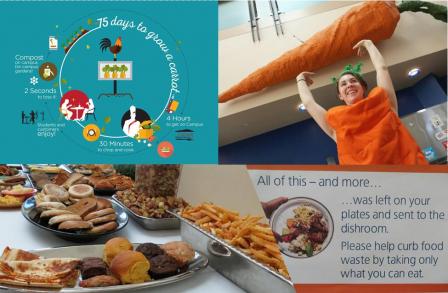 Keene State College
Keene State College
Narrative Category Winner, Education and Outreach
Keene State College Dining Services is committed to helping students recognize the far reaching impact of wasted food by implementing outreach initiatives including: table top announcements, waste buffets, waste demonstrations and a presentation by food waste advocate Jonathan Bloom. Their campaign evolved from and revolves around our spokes-vegetable “The Carrot” who represents the journey every vegetable makes from garden to plate to compost. “The Carrot” makes appearances in the Dining Commons several times every year (both in human form and in the student commissioned sculpture), including freshmen orientation, as a gentle reminder to be thoughtful about food choices.
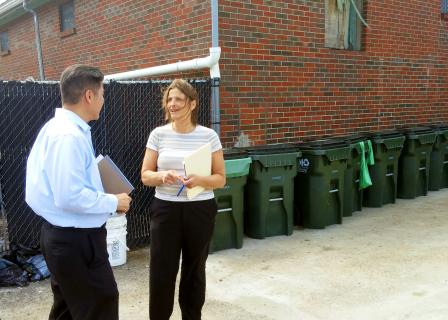 Massachusetts Department of Environmental Protection (MassDEP)
Massachusetts Department of Environmental Protection (MassDEP)
Narrative Category Winner, Endorser
“The Massachusetts Department of Environmental Protection is proud to receive U.S. EPA’s National Food Recovery Challenge Endorser Award for our program to reuse, recycle and compost food waste from commercial entities across the Commonwealth. We also are pleased to see so many Massachusetts institutions recognized as national leaders for their efforts to divert food waste from disposal.” -- MassDEP Commissioner Martin Suuberg
2014 was a pivotal year for Massachusetts in the area of sustainable food management. In October, on the heels of a multi-year outreach, education, assistance, and market development plan, MassDEP enacted a ban on disposal of commercial organic materialsExit by Massachusetts businesses and institutions that dispose of one ton or more of these materials per week.
Recognizing that wasted food comprises 15 percent, or nearly one million tons, of municipal solid waste disposed in Massachusetts per year, MassDEP proposed the ban as a major component of ambitious waste diversion goals outlined in its 2020 Solid Waste Master Plan.
In the period leading up to the ban, MassDEP (and RecyclingWorks in Massachusetts, a recycling assistance program funded by MassDEP to help businesses maximize recycling, reuse, and wasted food diversion opportunities) met with representatives from the various sectors affected by the ban, including, but not limited to, colleges and universities, hospitals, venues, supermarkets, public health officials, solid waste facilities, and food banks.
These efforts resulted in increased awareness of the need to manage food materials more responsibly and led to an open dialogue about how to manage it, which continued through regular Organics Subcommittee meetings at MassDEP’s Boston office. MassDEP partnered in research concerning effective on-site management of organic waste, and MassDEP and RecyclingWorks compiled helpful resources on their websites to provide information on the scope of wasted food services available and the best management practices available for using them.
